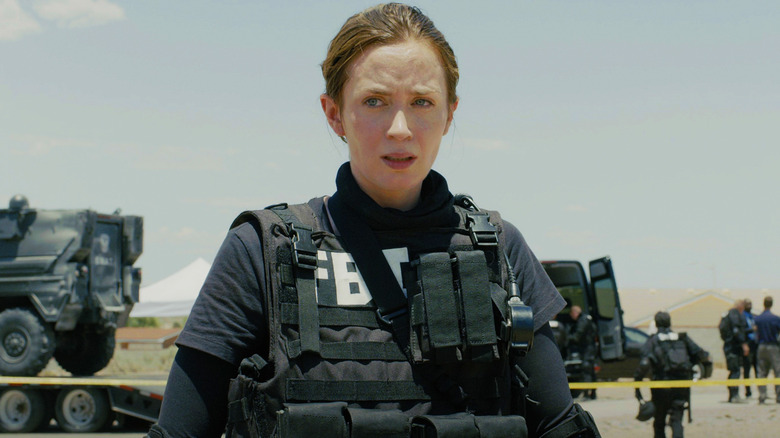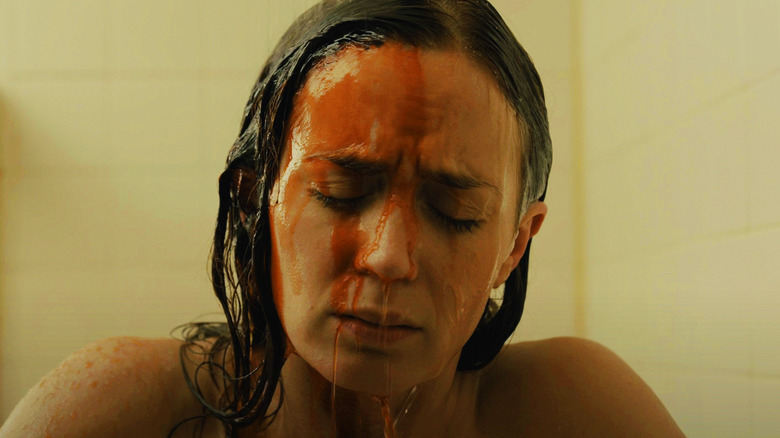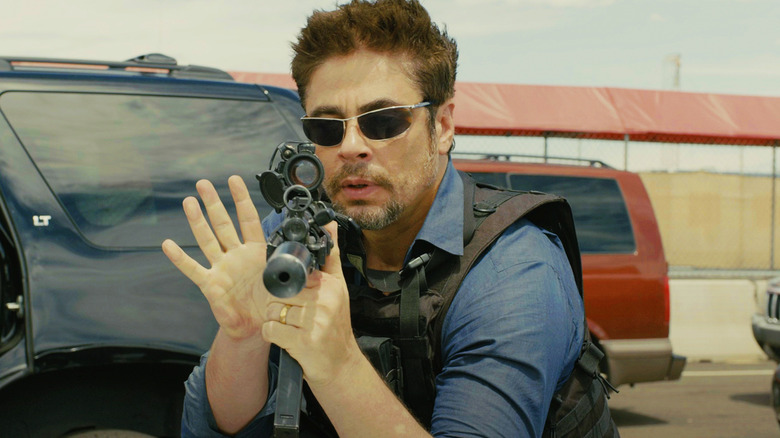One Of Denis Villeneuve's Best Films Came With Life-Threatening Risks
It's a good thing that "Sicario" is often cited as the best Denis Villeneuve movies, seeing as the director, cast, and crew apparently risked their lives to make it. Imagine putting yourself through life-threatening situations just to witness the poor reviews roll in and the almighty Tomatometer bestow an abject splat upon your film. Thankfully, "Sicario" currently stands at a muscular 92% on Rotten Tomatoes, making it the third highest-rated of Villeneuve's films on the website, behind "Arrival" and "Dune: Part Two."
But without "Sicario," those other two blockbusters arguably wouldn't exist. This was the movie that established Villeneuve as a director capable of balancing human drama with large-scale action and set him on a course to shepherd the big-budget movies he's now known for. As "Dune: Part Two" crosses box office milestone after box office milestone, "Sicario" still stands as the movie that made it all possible.
As such, all the risk involved in making the 2015 thriller was surely worth it. But that doesn't mean it wasn't an at-times traumatic experience for those involved. The movie explores the war between the U.S. and Mexican cartels, with Emily Blunt's good-hearted FBI Special Agent Kate Mercer at the center of this particular moral gray area. Led by CIA Agent Matt Graver (Josh Brolin) and accompanied by assassin Alejandro Gillick (Benicio del Toro), Mercer quickly discovers that the world into which she's thrust is even more dangerous and convoluted than she'd thought. Which is exactly what it was like for the people making the film.
Shooting Sicario came with significant risks
Recalling the making of "Sicario," producer Basil Iwanyk spoke to The Hollywood Reporter, where he remembered accompanying Denis Villeneuve, producer Ed McDonnell, and stunt coordinator J.J. Perry on a research trip to Juarez, Mexico. As Iwanyk remembers it, the trip became incredibly tense after Perry noticed that the group's SUV was being followed, despite the presence of two machine gun-toting federal agents. Of course, everyone remained unharmed, but this moment did make it into the movie in the form of the bridge scene in which Kate Mercer, Matt Graver, and Alejandro Gillick realize they're being tailed on their way out of Mexico and quickly launch a full-on assault on their pursuers.
But it wasn't just perilous research trips that made "Sicario" a tough film to make. Shooting her fight scene with Jon Bernthal's dirty cop, Ted, had quite an impact on Emily Blunt. After shooting this scene, the THR piece states, the actress had "trouble sleeping." Blunt herself previously spoke to The Guardian about the scene in question, in which Ted starts physically assaulting Mercer after realizing she knows he's working with the cartel. The actress said:
"We wanted it to be very authentic, to not feel too choreographed, because she thinks she's going to die, and that's what it has to look like. It had quite a lasting effect on me – and I'm not someone who takes my work home with me. But I couldn't sleep after that scene, because it was the embodiment of what would happen naturally: someone of my size would inevitably be overpowered by a person Jon's size. So when you physically put yourself in that position and you shoot it all day, it has a jarring effect. I felt like my skin was on fire."
Sicario's intensity partly came from an intense shoot
"Sicario" is obviously remarkable for its box office success, making $84.2 million on a $30 million budget, as well as establishing Denis Villeneuve as a go-to blockbuster filmmaker. It also remains one of the director's best movies because of the aforementioned balance between human drama and grand action set-pieces. But if there's one thing that sticks with me it's the movie's at times overwhelming sense of dread. The ambient level of foreboding throughout "Sicario" makes it linger in the mind far more than any box office success or wider cultural impact. "Sicario" feels dangerous. It feels like something fundamental and important has gone awry.
Much of that sense of doom is down to Taylor Sheridan's script, Villeneuve's tight pacing and fastidious blocking of scenes (Josh Brolin's torture scene in particular being a good example), and, of course, Roger Deakin's expert cinematography. There's also a handful of more subtle tricks employed by the filmmakers, such as the hidden screaming sounds layered onto the "Sicario" audio mix. Then, there's the fact the film provides no easy, concrete answers and deals throughout with morally questionable subject matter.
But it also seems like parts of actually making the film were about as tense and emotionally taxing as the events in the film itself. Establishing a cinematic reality that doesn't necessarily directly correspond to our own reality but still feels real is one of the most important elements of filmmaking and in this instance, it seems as though the experience of making "Sicario" directly played into making the harrowing events of the film feel so enduringly real.


